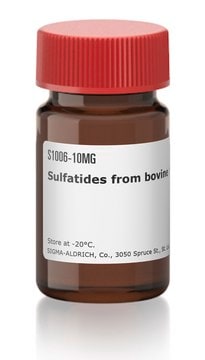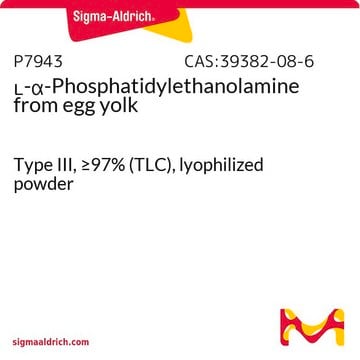C4905
Galactocerebrosides from bovine brain
≥97% (TLC)
Synonym(s):
Ceramide β-D-galactoside
Sign Into View Organizational & Contract Pricing
All Photos(2)
About This Item
Recommended Products
Assay
≥97% (TLC)
form
powder
storage temp.
−20°C
Looking for similar products? Visit Product Comparison Guide
Related Categories
General description
A mixture of type I (containing α-hydroxy fatty acid) and type II (containing non-hydroxy fatty acid) cerebrosides. Galactocerebroside (GalCer) is a glycosphingolipid, that consists of a single galactose residue, connected to ceramide . GalCer is present within the exofacial leaflet of the lipid bilayer.
Application
Galactocerebrosides from bovine brain has been used to find the receptor activity of surface-immobilized galactosylceramide. It has also been used in sulfatide binding assay.
Biochem/physiol Actions
Galactocerebroside (GalCer) participates in the progression and maintenance of myelin. This oligodendroglial lipid is used as an immunohistochemical tool for studying oligodendrocytes.
Galactose linked to ceramide by a β-glycosidic linkage; the major lipid in adult brain, representing approximately 16% of total lipid; they are mainly localized to myelin and are markedly reduced in demyelinating diseases.
Storage Class Code
11 - Combustible Solids
WGK
WGK 3
Flash Point(F)
Not applicable
Flash Point(C)
Not applicable
Personal Protective Equipment
dust mask type N95 (US), Eyeshields, Gloves
Certificates of Analysis (COA)
Search for Certificates of Analysis (COA) by entering the products Lot/Batch Number. Lot and Batch Numbers can be found on a product’s label following the words ‘Lot’ or ‘Batch’.
Already Own This Product?
Find documentation for the products that you have recently purchased in the Document Library.
Customers Also Viewed
Piglet ileal mucus contains protein and glycolipid (galactosylceramide) receptors specific for Escherichia coli K88 fimbriae.
Blomberg L, et al.
Infection and Immunity, 61(6), 2526-2531 (1993)
Oligodendrocyte morphology
Encyclopedia of Neuroscience (2009)
Gangliosides and Autoimmune Peripheral Nerve Diseases
Progress in Molecular Biology and Translational Science, 156, 355-382 (2018)
Scaffold-forming and adhesive contributions of synthetic laminin-binding proteins to basement membrane assembly
McKee K K, et al.
The Journal of Biological Chemistry, 284(13), 8984-8994 (2009)
Karen K McKee et al.
The Journal of biological chemistry, 284(13), 8984-8994 (2009-02-05)
Laminins that possess three short arms contribute to basement membrane assembly by anchoring to cell surfaces, polymerizing, and binding to nidogen and collagen IV. Although laminins containing the alpha4 and alpha5 subunits are expressed in alpha2-deficient congenital muscular dystrophy, they
Our team of scientists has experience in all areas of research including Life Science, Material Science, Chemical Synthesis, Chromatography, Analytical and many others.
Contact Technical Service













